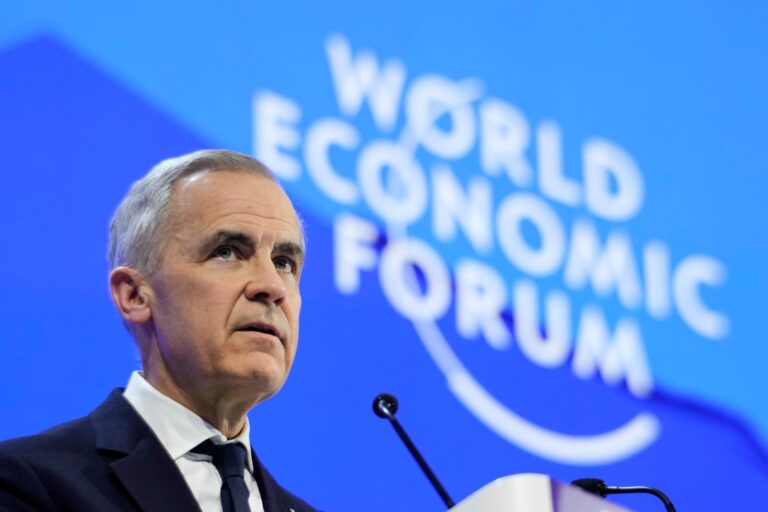A federal government tax decision last summer wiped out projected revenue of more than $7 billion over five years. But the implications of that decision go far beyond Canada’s coffers.
Ottawa’s move to cancel its digital services tax (DST) raises questions about our ability to independently develop laws and regulations for our digital economy. At risk is the capacity of our elected officials to govern telecommunications, the internet, cybersecurity and data management effectively in the public interest.
The three-per-cent tax on revenue generated by online services and transactions made in Canada became law in 2024 after years of planning. First payments — including from U.S tech giants Apple, Google and Meta — were due the end of June.
But the government abruptly scrapped the tax just hours before it was set to take effect. It was framed as a strategic move to avoid trade retaliation after U.S. President Donald Trump threatened tariffs in response to what he called a discriminatory tax targeting American firms.
Explaining Canada’s decision, Finance Minister François-Philippe Champagne said that rescinding the DST would allow talks on a new economic and security relationship with the U.S. to move forward and help create jobs.
Canada must ensure its digital sovereignty in the face of U.S. threats
That narrative, however, obscured a more concerning development. The decision to abandon the tax was not merely a bilateral trade dispute. It was the result of a sustained and indirect lobbying campaign by U.S.-based technology firms using U.S trade representatives, business associations and the U.S. executive itself.
The strategy is a growing threat to Canadian digital sovereignty and one that Canadians must urgently recognize and address.
New research from a TechLobby project, a national research initiative examining how Big Tech firms apply pressure in Canada, documents how traditional tracking of lobbying efforts fails to capture the full extent of this strategy. Canada’s lobbyist registry, while intended to improve transparency around corporate influence, is ill-equipped to reveal how U.S. firms leverage foreign governments and third-party actors to shape Canadian policy from afar.
In 2024, TechLobby noted that “international trade” was one of the top subject matters in lobbying communications reported by major U.S. tech companies in Canada. It was a dramatic shift from 2023, when the topic was absent. Yet the number of direct efforts by these firms regarding the digital services tax itself remained remarkably low. Instead, U.S.-based corporations and business lobby representatives, like the U.S Chamber of Commerce, advocated for Big Tech interests in other Canadian forums, for example, in meetings of the Committee on International Trade.
The U.S. Chamber of Commerce has been vocal in condemning Canadian digital policies, including the DST, the Online News Act and the Online Streaming Act. These legislative efforts have been designated by the Office of the United States Trade Representative as “foreign trade barriers.”
The office formally launched a complaint against the digital services tax under CUSMA, the Canada-United States-Mexico Agreement, in August 2024. The White House followed with a public declaration that the DST discriminated against American companies and violated trade obligations.
What appears on the surface to be state-to-state pressure is in fact a form of corporate lobbying by proxy.
The policy interests of multinational platform corporations (Google, Meta, Amazon, Apple) are being reframed as in the national interest of the United States.
When Canadian officials yield to this pressure, they are effectively allowing foreign tech corporations to shape our domestic policy without any transparency, accountability or public debate. Our regulatory sovereignty is hollowed out if taxation, content control and news bargaining are all framed as trade violations affecting U.S.-based firms.
Canada’s Registry of Lobbyists does not account for these expressions of bilateral pressure. This gap allows major actors to engage in indirect influence campaigns with little to no public visibility. The registry, as currently designed, cannot capture what it does not recognize.
To respond effectively, Canada must expand its understanding of lobbying beyond traditional domestic efforts.
This includes adopting more rigorous disclosure standards for international policy influence, enhancing parliamentary oversight of trade-related policy reversals and increasing public transparency around consultations involving foreign countries and multinational firms.
Canada should also follow up on recent calls by Canadian academics and civil society groups to establish, among other things, an independent national oversight body to help Canadians trace and understand foreign threats to our digital sovereignty. Such an institution would help shed light on corporate and foreign influences that are beyond the scope of traditional lobbying.
More broadly, Canadians must resist domestic policymaking that is dictated by the interests of U.S-based Big Tech corporations. The digital tax reversal must be understood not as an isolated case but as a signal of how trade diplomacy is being manipulated to undermine Canada’s digital sovereignty.
As digital technologies continue to reshape the economic, political and cultural dimensions of public life, Canadians must ask: Who governs the digital sphere? Suppose the answer increasingly lies not in our legislatures or public institutions, but in the boardrooms of foreign tech giants and the corridors of Washington? In that case, the very foundations of our democratic self-determination are under threat.
This dynamic is particularly urgent given the state of trade talks with the U.S. They have been on hold since Trump ended them in response to the airing of an anti-tariff ad by the Ontario government that featured the words of former U.S. president Ronald Reagan.
Also up in the air are proposed online harms legislation (Bill C-63) and artificial intelligence regulations (Bill C-27) that died when Parliament was prorogued last winter. These measures aimed at safeguarding the public interest in the digital sphere are equally vulnerable to the same U.S. lobbying strategies that derailed the DST.
We must all confront the reality of the growing power held by U.S.-based technology platforms. In particular, the government must take steps to insulate domestic policymaking and invest in our digital economy. That means building sovereign cloud and compute infrastructure, strengthening lobbying transparency, ensuring meaningful public input in digital-policy consultations and promoting procurement from Canadian tech firms. Otherwise, Canada risks ceding its ability to regulate the sector on its own terms.
Reasserting our digital sovereignty is not about protectionism. It’s about ensuring that our politicians — not corporations hiding behind intermediaries — decide how technology serves Canadians.













